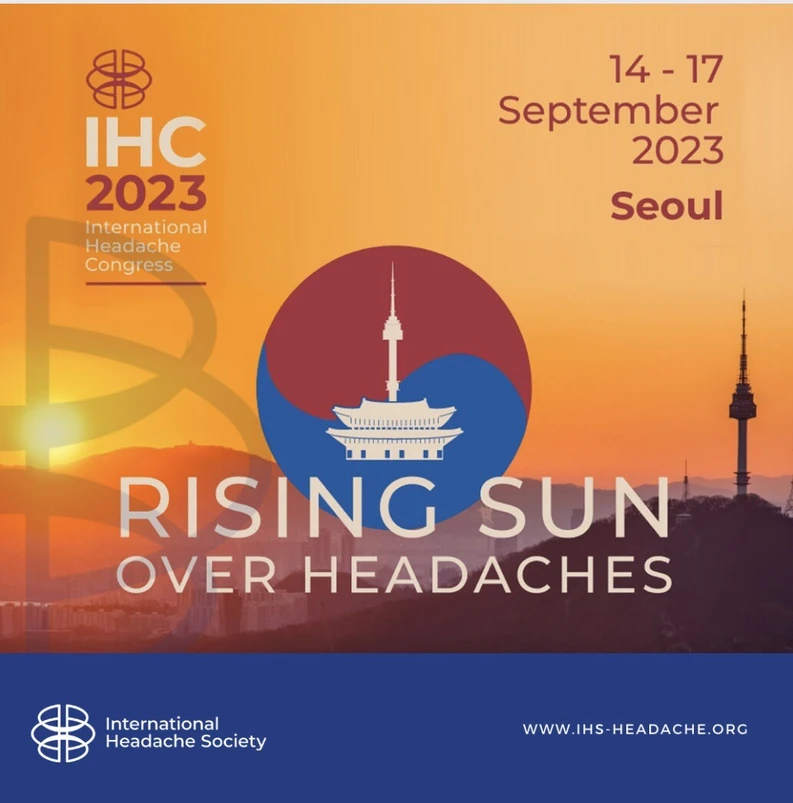The International Headache Society (IHS) is the leading international headache charity, which exists to promote awareness and knowledge about headache worldwide, through science, education and advocacy.
They publish the International Classification of Headache Disorders, which underpins the diagnosis of migraine and other headache disorders. Their official journal, Cephalalgia, publishes ground-breaking research on all aspects of headache.
And every two years, they organise a conference, the International Headache Congress, to discuss all the latest research and developments in the field of headache. This year it was held in Seoul, from 14-17 September.
Migraine Foundation Aotearoa New Zealand was invited to contribute to a session run by the IHS-Global Patient Advocacy Coalition, of which we are a member. You can watch our 5 minute video presentation of our work in NZ here. This also meant we received a free virtual registration to the Congress, with access to most of the conference sessions.
Here are some highlights:
-
The US National Institute of Health (a huge funder of medical research) wants to enhance funding of research into non-addictive pain treatments, after recognising that there have been no new drugs of this type approved (excluding migraine treatments) for five years. This could lead to new treatment options for headache.
-
We know menstrual migraine is very common in women with migraine, and these attacks tend to be more severe and prolonged and accompanied by other symptoms. Long-acting triptans (e.g. frovatriptan or naratriptan) can be very effective treatments but we don’t have these in New Zealand. The calcitonin gene-related peptide (CGRP) monoclonal antibodies such as Emgality can also be effective – we do have two of these medications, but not funded. CGRP is a protein in the brain which is implicated in migraine attacks – blocking this protein can prevent and treat migraine.
-
The other type of medication that targets CGRP is the gepant – unlike Emgality, which is injected, these are taken orally as tablets or as a nasal spray. One gepant is going through the process of being approved in NZ, atogepant, which is used as a preventive treatment. There are some differences in how the gepants and the monoclonal antibodies work – the gepants act on two types of pain fibres that send information about pain to the brain, whereas the monoclonal antibodies only act on one. For people that haven’t had an effect with a monoclonal antibody, a gepant would be worth trying. It only takes about five days to clear the gepants from the body, compared to the monoclonal antibodies, which take around five months to clear. For people who are wanting to become pregnant, the gepants might be a better option, as the safety of these medications in pregnancy is unknown and it is advised to avoid pregnancy while these drugs are in your system.
-
A new target for treatment is a protein called pituitary adenylate cyclase-activating polypeptide (PACAP), which appears to act independently of CGRP but is also involved in triggering migraine attacks. A ‘proof of concept’ trial of a PACAP monoclonal antibody shows promise – expect to hear more about this in coming years.
-
From functional brain imaging studies, the increased brain sensitivities seen in migraine can be rebalanced and reduced with effective treatment.
There was much discussion about the CGRP medications, and how much better they were than traditional oral preventive medications like topiramate, both because they were more effective and had fewer side effects. This highlighted how serious the issue of lack of medicine access is in New Zealand. We are missing out on treatments that are standard of care in other countries.
This issue affects everyone in New Zealand, as we have limited access to treatments for many diseases, including cancers and rare disorders. We’re supporting Patient Voice Aotearoa in their campaign My Life Matters to raise awareness of the need for more medicine funding for the 2023 election.
If you’re in Auckland on October 4, please consider attending the politician’s debate on this issue, from 6.30-8pm at Sir Owen G Glenn Building, 12 Grafton Road, Auckland Business School, University of Auckland. Politicians from five parties will be there, including the current Minister of Health Ayesha Verrall, to answer questions and lay out their party’s commitments. This is your chance to ask whether the politicians will increase funding of medicines so New Zealand is not at the very bottom of comparable countries in terms of medicines access, whether they will make the link between poor health professional morale, health care workforce shortages and lack of medicine access, and whether they will implement reforms of Pharmac to improve and quicken their processes.


